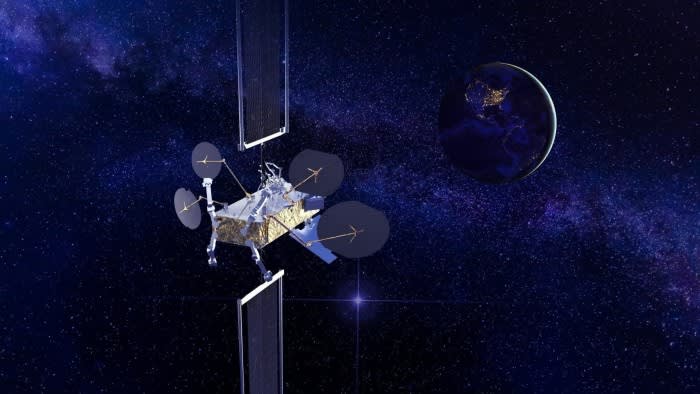Roula Khalaf, Editor of the FT, selects her favourite stories in this weekly newsletter.
An alliance combining the space activities of Thales and Airbus would be anti-competitive and threaten to create a monopoly in Europe that would be detrimental to customers and industry, the head of the continent’s third-biggest satellite manufacturer has warned.
Marco Fuchs, head of the family-controlled and Bremen-based OHB, told the Financial Times he planned to raise concerns with EU competition authorities about a potential tie-up between Europe’s two biggest satellite manufacturers, should talks between them result in concrete proposals.
He said: “That would be a very strong, market-dominating player. We are concerned. I think competition will be diminished.”
The companies, along with Italy’s Leonardo, are in exploratory discussions about an alliance to create a European space company spanning satellite manufacturing, space systems and services. Thales holds most of its space activities in a joint venture with Leonardo called Thales Alenia Space, in which the French group holds a two-thirds stake.
“The discussion aims to see how Europe can be more competitive and have more critical mass,” said a person involved in the exploratory discussions.
The talks come as Airbus and Thales are attempting to deal with a sharp downturn in their traditional telecommunications satellite markets, where commercial customers operating in geostationary orbit have been hit by competition from Elon Musk’s Starlink low-earth-positioned broadband network.
European manufacturers are also handicapped by the scale of the bloc’s institutional and government demand, which is just a fraction of that available to US companies in their domestic market through Nasa, public institutions and the Pentagon.
Combining the two companies’ space activities would “certainly shake up Europe’s space landscape”, reducing the number of prime contractors capable of handling large space programmes to the new alliance and OHB, said Caleb Henry, analyst at Quilty Space. “This would make intra-continental competition harder for Europe.”
It was unclear whether a deal would make sense given the lack of a sizeable public-sector demand to drive economies of scale, he added.
For OHB, a combined Airbus-Thales Alenia Space would be a formidable competitor in areas such as remote sensing and navigation satellites. However, Henry said it could also spur the German government to send more business OHB’s way to “maintain, at the very least, a competitive duopoly in Europe”.
People close to the discussions said that there was no guarantee an agreement would be reached. Previous talks in 2019 failed to lead to any concrete proposals. However, the pace and price of innovation had accelerated since Musk’s SpaceX began launching Starlink satellites in 2019, making industrial restructuring more pressing.
“It is clear that SpaceX has disrupted this commercial business and taken market share from our customers,” said one satellite group executive. Lower demand and a faster R&D cycle meant economies of scale were essential for survival, the person added.
Neither Airbus nor Thales would comment on the discussions.
A new space entity dominated by French companies would come on top of rising tensions with Germany since Berlin pushed to open Europe’s launcher market to competition, challenging French leadership in the field.
German space executives were also irritated last year by initial industry proposals for Europe’s new secure communication satellite constellation, known as Iris2, which Berlin claimed did not include sufficient German representation.
“Germany has to be very careful it doesn’t suffer due to the fact that France and Italy have an issue in their space businesses,” said one German executive. “The question is, if they find synergies, will they lay off people in Germany or move workload from Germany elsewhere.”
If this were the case, German institutional demand could be moved to companies such as OHB to compensate, he said.
Source link : http://www.bing.com/news/apiclick.aspx?ref=FexRss&aid=&tid=671dcd917c804bdfb7df3cb47d0f1fbf&url=https%3A%2F%2Fwww.ft.com%2Fcontent%2F650d5e2a-65c4-4c72-bf66-92ccdf25f5f7&c=4442919619410587320&mkt=de-de
Author :
Publish date : 2024-10-26 22:00:00
Copyright for syndicated content belongs to the linked Source.
